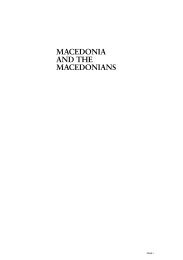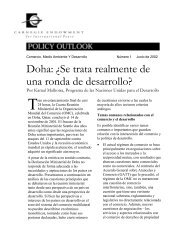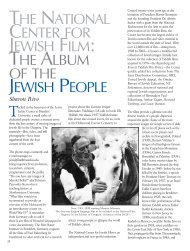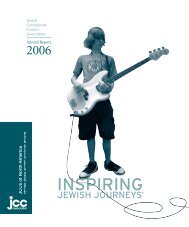WELCOMING THE STRANGER: NYANA and the Indochinese ...
WELCOMING THE STRANGER: NYANA and the Indochinese ...
WELCOMING THE STRANGER: NYANA and the Indochinese ...
Create successful ePaper yourself
Turn your PDF publications into a flip-book with our unique Google optimized e-Paper software.
erupting. The absence of heat <strong>and</strong> hot water<br />
as well as o<strong>the</strong>r housing-related issues threat<br />
ened <strong>the</strong> health of <strong>the</strong> refugees. Inter-group<br />
<strong>and</strong> inter-racial stresses flared up. Local<br />
agencies felt frustrated at being unable to<br />
cope with <strong>the</strong>se newest members of <strong>the</strong>ir<br />
communities—refiigees whose language, cul<br />
ture, <strong>and</strong> life experience seemed so alien.<br />
The Refugee Urban Skills Project grew out<br />
of a <strong>NYANA</strong>-based graduate social work<br />
student project. In 1983, two students, one<br />
from Fordham <strong>and</strong> <strong>the</strong> o<strong>the</strong>r from <strong>the</strong><br />
Wurzweiler School of Social Work at Ye<br />
shiva University, were sent into <strong>the</strong>se com<br />
munities to assess <strong>the</strong> needs <strong>and</strong> to start<br />
addressing some of <strong>the</strong>m. The students began<br />
forming refugee tenants groups, visiting lo<br />
cal agencies, <strong>and</strong> providing orientation to<br />
both refugees <strong>and</strong> local service providers<br />
such as clinics <strong>and</strong> schools. The student<br />
effort highlighted <strong>the</strong> urgent needs <strong>and</strong> also<br />
provided a viable <strong>and</strong> effective model for<br />
meeting <strong>the</strong>m.<br />
With grants from <strong>the</strong> Ford Foundation,<br />
Exxon Corporation, <strong>and</strong> <strong>the</strong> Lebrun Founda<br />
tion as well as fiinds from <strong>the</strong> New York State<br />
Refugee Program, <strong>the</strong> Refiigee Urban Skills<br />
Project formally began in February of 1984,<br />
Under <strong>the</strong> supervision of one of <strong>the</strong> recently<br />
graduated students involved with <strong>the</strong> project<br />
from <strong>the</strong> beginning, service teams were formed<br />
<strong>and</strong> trained to work in high-density refiigee<br />
communities. Operating in <strong>the</strong> Bronx <strong>and</strong><br />
Brooklyn, <strong>the</strong> two boroughs of New York City<br />
where <strong>Indochinese</strong> refugees were resettled in<br />
large numbers, <strong>the</strong>se teams had four goals;<br />
1, teach refugees vital survival skills for<br />
fiinctioning in a complex urban setting<br />
2, help develop linkages <strong>and</strong> relationships<br />
with a host of locally based agencies <strong>and</strong><br />
resources<br />
3, assist refugees with specific housing,<br />
crime, intergroup, <strong>and</strong> educational prob<br />
lems<br />
4, empower refugees to advocate for <strong>the</strong>m<br />
selves <strong>and</strong> develop communal <strong>and</strong> insti<br />
tutional supports<br />
Journal of Jewish Communal Service / 90<br />
FALL 1998<br />
The typical Urban Skills team, of which<br />
<strong>the</strong>re were three, comprised a master's-level<br />
social worker <strong>and</strong> a bilingual paraprofes-<br />
sional aide. These community aides were<br />
<strong>the</strong>mselves refugees who were intimately<br />
aware of <strong>the</strong> problems <strong>and</strong> concerns of <strong>the</strong>ir<br />
communities <strong>and</strong> lived in <strong>the</strong> very same ar<br />
eas. The Project's basic approach stressed <strong>the</strong><br />
need for staff to be out in <strong>the</strong> community, in<br />
<strong>the</strong> refugee apartments <strong>and</strong> neighborhoods.<br />
Using <strong>the</strong> group work modality, <strong>the</strong>se teams<br />
worked in apartment buildings with a signifi<br />
cant refiigee clientele.<br />
The Refiigee Urban Skills Project was<br />
active in more than 40 buildings in both <strong>the</strong><br />
Bronx <strong>and</strong> Brooklyn with a combined ten<br />
ancy, refiigee, <strong>and</strong> non-refugee, of approxi<br />
mately 12,000 people. In every building<br />
where <strong>the</strong> Urban Skills teams worked, <strong>the</strong><br />
improvements in basic services affected all of<br />
<strong>the</strong> residents. Part of <strong>the</strong> project's philosophy<br />
was that all of <strong>the</strong> building's tenants, whe<strong>the</strong>r<br />
native- or foreign-born, were invited to join<br />
<strong>the</strong> project's tenant-based building improve<br />
ment teams. The refiigee tenant groups orga<br />
nized by <strong>the</strong> Project were viewed as effective<br />
instruments by <strong>the</strong>ir non-refiigee neighbors.<br />
For example, in one apartment building in<br />
<strong>the</strong> Fordham area of <strong>the</strong> Bronx, "We didn't<br />
know howto get along in this city <strong>and</strong> couldn't<br />
talk to anybody except o<strong>the</strong>r Vietnamese,"<br />
recalled Tran N. who lived in that apartment<br />
building. Although rents were low, <strong>the</strong>re<br />
were serious heat <strong>and</strong> hot water problems,<br />
bursting pipes, <strong>and</strong> a leaking roof <strong>and</strong> win<br />
dows. Much of what once was inhospitable<br />
improved with <strong>the</strong> help of <strong>the</strong> Urban Skills<br />
team who formed a tenants association that<br />
included many American tenants. This join<br />
ing toge<strong>the</strong>r of forces—putting all rent fiinds<br />
into an escrow account <strong>and</strong> learning o<strong>the</strong>r<br />
empowering <strong>and</strong> advocacy techniques—was<br />
instrumental in obtaining improvements in<br />
<strong>the</strong> building <strong>and</strong> in building positive relation<br />
ships with neighbors. Within a year of <strong>the</strong><br />
tenants association's formation, significant<br />
repairs were done in <strong>the</strong> building.








